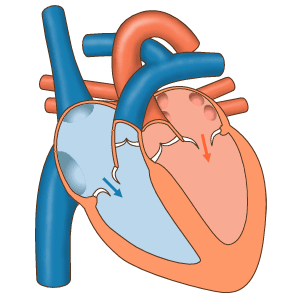Cardiology
Cardiology is a branch of medicine dealing with disorders of the heart as well as parts of the circulatory system. The field includes medical diagnosis and treatment of congenital heart defects, coronary artery disease, heart failure, valvular heart disease and electrophysiology. Physicians who specialize in this field of medicine are called cardiologists, a specialty of internal medicine. Pediatric cardiologists are pediatricians who specialize in cardiology. Physicians who specialize in cardiac surgery are called cardiothoracic surgeons or cardiac surgeons, a specialty of general surgery.
Specializations
All cardiologists study the disorders of the heart, but the study of adult and child heart disorders are through different training pathways. Therefore, an adult cardiologist (often simply called "cardiologist") is inadequately trained to take care of children, and pediatric cardiologists are not trained to take care of adult heart disease. The surgical aspects are not included in cardiology and are in the domain of cardiothoracic surgery. For example, coronary artery bypass surgery (CABG), cardiopulmonary bypass and valve replacement are surgical procedures performed by surgeons, not cardiologists. However the insertion of stents, pacemakers are performed by cardiologists
- Adult cardiology
- Cardiac electrophysiology
- Clinical cardiac electrophysiology
- Cardiogeriatrics
- Echocardiography
- Interventional cardiology
- Pediatric cardiology

-
Do cardiologists do open heart surgery?
How a Thoracic Surgeon differs from a Cardiologist or Pulmonologist. Acardiologist will primarily diagnose disorders of the heart and treat them with medication. Cardiologists also perform interventions on the arteries in the heartworking through puncture wounds in the groin, but they do not perform open surgery.
-
What is the difference between a cardiologist and a heart surgeon?
Cardiology is medicine's arsenal against America's No. 1 cause of death:cardiovascular disease. Patients who have heart and blood vessel diseases turn to a cardiologist for treatment. When the diagnosis indicates the need for an operation, the cardiologist refers them to a cardiac, or cardiothoracic,surgeon.
-
What is the difference between cardiothoracic surgeon and a cardiovascular surgeon?
What is the difference between cardiovascular and thoracic surgery? Cardiacor cardiovascular surgery focuses on the heart and great vessels. Generalthoracic surgery treats diseases of the lungs, esophagus, chest wall, and mediastinum. Congenital heart surgery focuses on infants and children with heart disease.
-
What do cardiothoracic surgeons do?
A cardiothoracic surgeon is a medical doctor who specializes in surgical procedures inside the thorax (the chest), which may involve the heart, lungs, esophagus, and other organs in the chest. As well as performing surgery, they also diagnose and treat diseases of these organs.

Heart Disorders
Cardiology is concerned with the normal functionality of the heart and the deviation from a healthy heart. Many disorders involve the heart itself but some are outside of the heart and in the vascular system. Collectively, the two together are termed the cardiovascular system and diseases of one part tend to affect the other.
-
Hypertension
Hypertension, also known as "high blood pressure", is a long term medical condition in which the blood pressure in the arteries is persistently elevated. High blood pressure usually does not cause symptoms.
-
Essential vs Secondary hypertension
Essential hypertension is the form of hypertension that by definition has no identifiable cause. It is the most common type of hypertension, affecting 95% of hypertensive patients, it tends to be familial and is likely to be the consequence of an interaction between environmental and genetic factors. Prevalence of essential hypertension increases with age, and individuals with relatively high blood pressure at younger ages are at increased risk for the subsequent development of hypertension. Hypertension can increase the risk of cerebral, cardiac, and renal events.
-
Complications of hypertension
Complications of hypertension are clinical outcomes that result from persistent elevation of blood pressure. Hypertension is a risk factor for all clinical manifestations of atherosclerosis since it is a risk factor for atherosclerosis itself. It is an independent predisposing factor for heart failure, coronary artery disease, stroke, renal disease, and peripheral arterial disease. It is the most important risk factor for cardiovascular morbidity and mortality, in industrialized countries.
-
Cardiac arrhythmia
Cardiac arrhythmia, also known as "cardiac dysrhythmia" or "irregular heartbeat", is a group of conditions in which the heartbeat is irregular, too fast, or too slow. A heart rate that is too fast – above 100 beats per minute in adults – is called tachycardia and a heart rate that is too slow – below 60 beats per minute – is called bradycardia. Many types of arrhythmia have no symptoms. When symptoms are present these may include palpitations or feeling a pause between heartbeats. More seriously there may be lightheadedness, passing out, shortness of breath, or chest pain. While most types of arrhythmia are not serious, some predispose a person to complications such as stroke or heart failure. Others may result in cardiac arrest.
-
Coronary artery disease
Coronary artery disease, also known as "ischemic heart disease", is a group of diseases that includes: stable angina, unstable angina, myocardial infarction, and sudden cardiac death. It is within the group of cardiovascular diseases of which it is the most common type. A common symptom is chest pain or discomfort which may travel into the shoulder, arm, back, neck, or jaw. Occasionally it may feel like heartburn. Usually symptoms occur with exercise or emotional stress, last less than a few minutes, and get better with rest. Shortness of breath may also occur and sometimes no symptoms are present. The first sign is occasionally a heart attack. Other complications include heart failure or an irregular heartbeat.
-
Cardiac arrest
Cardiac arrest is a sudden stop in effective blood flow due to the failure of the heart to contract effectively.] Symptoms include loss of consciousness and abnormal or absent breathing. Some people may have chest pain, shortness of breath, or nausea before this occurs. If not treated within minutes, death usually occurs.
-
Congenital heart defects
A congenital heart defect, also known as a "congenital heart anomaly" or "congenital heart disease", is a problem in the structure of the heart that is present at birth. Signs and symptoms depend on the specific type of problem. Symptoms can vary from none to life-threatening. When present they may include rapid breathing, bluish skin, poor weight gain, and feeling tired. It does not cause chest pain. Most congenital heart problems do not occur with other diseases. Complications that can result from heart defects include heart failure.
